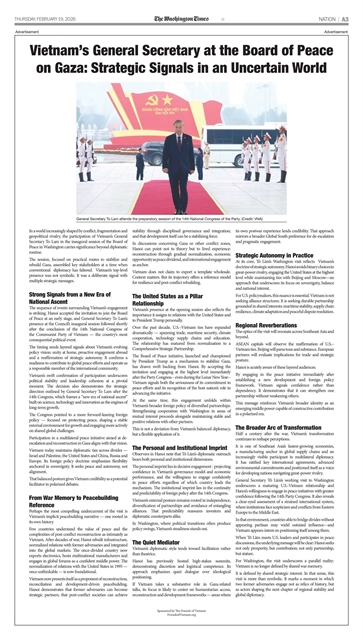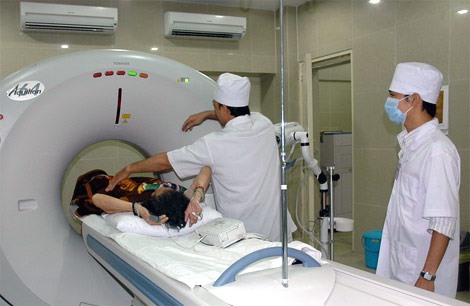 Op-Ed
Op-Ed

The boom of private health care service is never ever blooming as now. But also never ever so many violations are found.
 |
Mai Phương
The private healthcare sector is booming in Việt Nam, and the most common comments about this have to do with how it has improved healthcare quality in the country, increased options and reduced overloading at State hospitals.
However, this rosy scenario has been tarnished by many violations with serious consequences including death.
While these have sparked outrage, they have never been seen or dealt with as a bigger, deeper problem than a few exceptions that can be dealt with on a case by case basis.
The root of the problem is the Government’s management of the private healthcare sector. To try and understand this better, let’s take a closer look at the latest tragedy that occurred early this month at private facility called Clinic 168 Hà Nội on Ngọc Hồi Road in Thanh Trì District.
A pregnant woman from Quảng Ninh Province was being treated at the clinic for vaginitis when she slipped into a coma, went brain-dead, and died several days later. Any unnatural death is a tragic, but what made this one a greater tragedy is that the clinic, owned by a Chinese doctor, was a known violator of regulations for years.
The violations were serious, too. In 2016 alone, several violations were recorded, including the employment of foreign doctors without a licence, providing unauthorised medical services and selling medicines directly after health checks instead of prescribing them.
How was the clinic allowed to operate for a long time despite such violations?
Some people chose to see the death of the woman as an accident that could happen at the hands of any doctor or in any clinic, public or private. This approach ignores a serious problem, and will allow careless, unprofessional or willfully negligent actions to continue unpunished.
And apart from the medical staff responsible for such “accidents,” officials are to blame for not dealing strictly with violations in a field like healthcare where people’s lives are at stake.
Authorities have responded to the latest public concern about weak management of healthcare services, particularly those provided by the health sector, with several welcome steps.
Health Minister Nguyễn Thị Kim Tiến ordered a general inspection of healthcare facilities from the central to the grassroots levels and all violations punished as per the law.
The Hà Nội health department’s Chief Inspector Nguyễn Việt Cường has dispatched four inspection teams to conduct surprise checks on private health clinics.
However, I think more has to be done if these steps are to go beyond locking the stable after the horse has bolted.
There are thousands of private clinics in the country. In the vicinity of general hospitals in major cities like Hà Nội and HCM City, many private clinics have opened. On a 100-metre stretch of Giải Phóng Street in front of the Bạch Mai Hospital, for example, I can count at least a dozen of them.
If such a large number of clinics function without any effective oversight for a long time, we are going to have a major healthcare crisis on our hands.
Meanwhile, the department has just three qualified staff in charge of supervising a total of about 3,000 private health clinics in Hà Nội. Most of the inspections and supervisory tasks are assigned to lower level (district, wards, etc.) administrations that are also short-staffed.
So there’s a big problem without easy solutions, right there.
Another aspect of the weak management is the weak punishments that have been meted out so far for violations, amounting to no more than a slap on the wrist.
Violators, usually the doctors and/or owners of private clinics, are asked to pay fines. Some have reopened their clinics after closing down for several months. Very rarely has a licence been withdrawn.
Yet another problematic part is the lack of focus from the part of authorities on preventative measures.
With a lot of netizen and media attention focused on this issue these days, it is time for the Government and the Health Ministry to review all existing procedures of granting licences to private grassroots healthcare facilities so that unqualified projects do not slip through the cracks.
Once the facilities are established, surprise checks must be far more stringent and frequent than has been the case so far. And the names of violators and their wrongdoings should be publicised on mass media because the public can make safer choices.
At a larger, super-macro level, we should revisit the public vs private healthcare debate. Studies have found that the performance of healthcare facilities depends in large part on the quality of management and oversight, as also the incentives the service providers enjoy.
There are indications that the profit motive can be a problematic factor in the healthcare industry, and that properly managed private-public partnerships can deliver some good results.
We’ve all heard stories about private clinics ordering tests that are not needed, over-prescribing medicines, and so on. All these aspects of the problem need to be looked at carefully when measures are taken to prevent unavoidable deaths of patients. — VNS